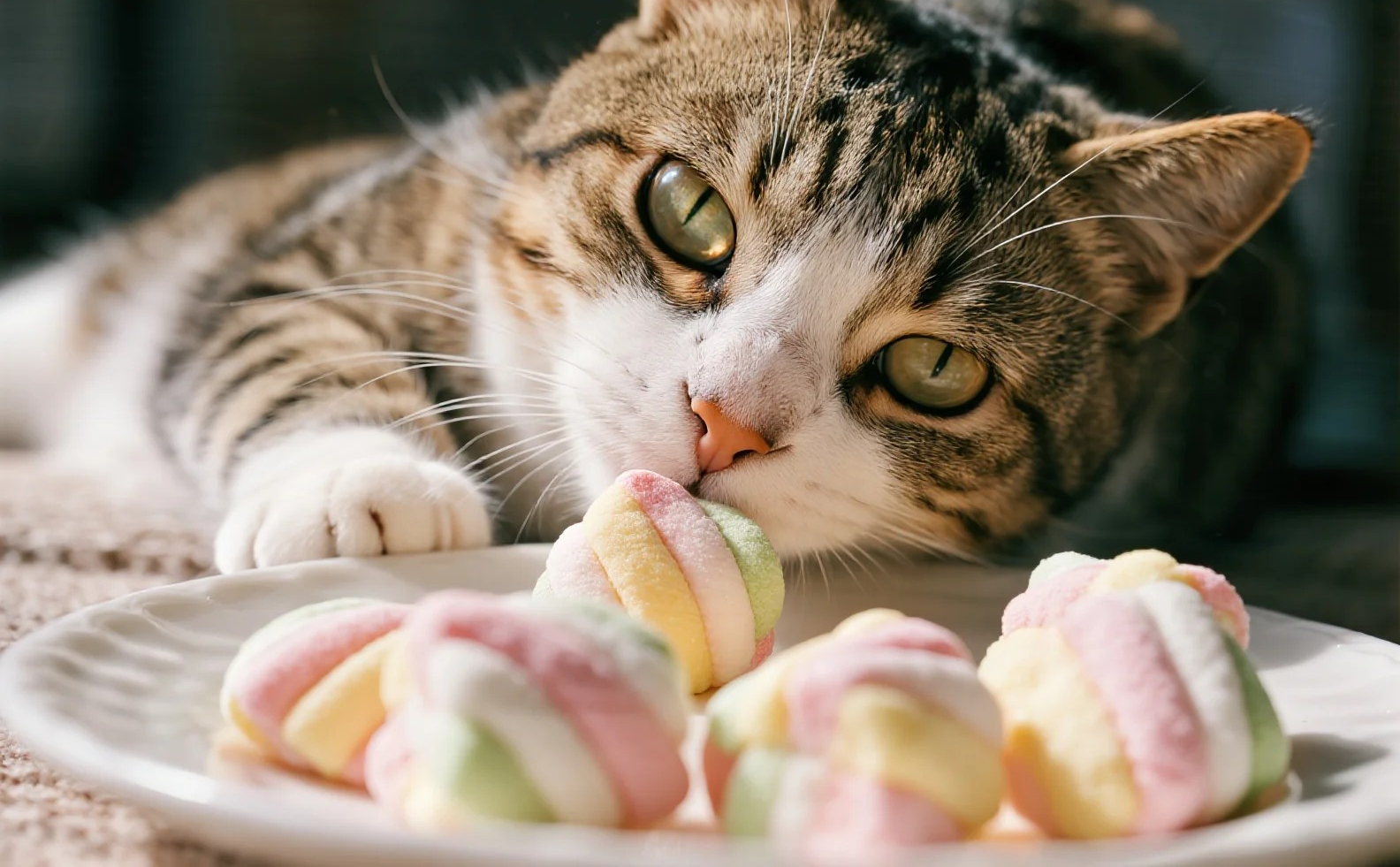When it comes to our beloved feline companions, we often find ourselves sharing bits of our food. While some treats are safe for cats, others can pose significant health risks, and marshmallows fall into the latter category.
Let’s explore the safety of giving marshmallows to cats, the potential risks involved, and healthier alternatives that cater to their dietary needs.
Table of Contents
The Composition of Marshmallows
Marshmallows are sweet, fluffy confections made primarily from sugar, corn syrup, gelatin, and air. While these ingredients make marshmallows a favorite treat among humans, they are not suitable for cats. Cats are obligate carnivores, meaning their digestive systems are primarily designed to process animal-based proteins, not sugary or carbohydrate-heavy foods.
Sugar and Cats
One of the main ingredients in marshmallows is sugar. While a small amount of sugar is generally non-toxic to cats, excessive consumption can lead to several health issues, including obesity, diabetes, and digestive problems. Cats have a limited ability to metabolize sugar, and their bodies are not equipped to handle high-carb snacks like marshmallows. Regularly including sugary treats in their diet can contribute to long-term health problems.
The Risks of Corn Syrup and Gelatin
Corn syrup is another common ingredient in marshmallows. This sugary syrup can lead to similar issues as sugar. Additionally, the gelatin found in marshmallows is derived from animal collagen, which may not be harmful in small quantities. However, it does not offer any significant nutritional benefits for cats. Moreover, the gelatinous texture may pose a choking hazard, especially for smaller or older cats who might struggle with it.
Digestive Disturbances
Cats have a delicate digestive system, and introducing foods that are not part of their natural diet can lead to gastrointestinal upset, including vomiting and diarrhea. While a single marshmallow might not cause immediate harm, the long-term effects of allowing cats to consume sugary, processed foods can severely disrupt their digestive health, leading to more significant issues over time.
Behavioral Aspects
Cats are curious creatures, often interested in whatever their human companions are eating. When they see you enjoying a treat like marshmallows, they may beg or try to snatch some for themselves. While it can be tempting to indulge their curiosity, it’s essential to resist the urge to share potentially harmful foods. Establishing boundaries concerning what your cat can or cannot eat helps reinforce a healthy diet and prevents unwanted health issues.
Allergies and Food Sensitivities
Just like humans, some cats may develop allergies or sensitivities to specific ingredients. Although marshmallows aren’t known for causing allergic reactions, it’s always wise to monitor your cat for any adverse reactions when introducing new foods into their diet. Symptoms such as itching, unusual behavior, or digestive issues warrant immediate attention.
Healthier Treat Alternatives
If you want to offer your cat a tasty treat, numerous healthier options exist that can satisfy their curiosity and sweet tooth without risking their health. Here are some alternatives to consider:
Catnip-Infused Treats: Catnip can be a delightful treat for many cats. You can find commercially prepared catnip treats or even mix some dried catnip with their regular food.
Cooked Meat: Shredded chicken or turkey can be a fantastic snack for your furry friend. Ensure it’s plain, without any seasoning, as many human spices can be toxic to cats.
Canned Pumpkin: Plain, canned pumpkin is a great source of fiber and can be a tasty, healthy treat. Just make sure it’s 100% pumpkin without any added sugars or spices.
Commercial Cat Treats: Many brands offer treats specifically designed for cats, focusing on their nutritional needs while providing flavors they love. Opt for those with high meat content and minimal additives.
- Fruits in Moderation: Safe fruits like small amounts of blueberries or watermelon can be offered occasionally. Remember, not all fruits are safe for cats, so always double-check before sharing.
Conclusion
In conclusion, while it may be tempting to share marshmallows with your cat, the potential risks far outweigh the joys of giving them a sweet treat. Sugar, corn syrup, and gelatin are not suitable for a cat’s digestive system and can lead to serious health issues. Instead, opt for healthier alternatives that cater to their nutritional needs and satisfy their curiosity.
Always consult your veterinarian if you have questions about your cat’s diet or if you seek safe treats to enhance their well-being. Remember, the best way to show love to your cat is through a healthy diet and plenty of affection!
